Racquetball - Quick Guide
Racquetball - Overview
Racquetball is a popular indoor racquet sport where players use a specially designed racket to play with a hollow rubber ball in an indoor or outdoor court. Very much similar to 40×20 American handball and British Racketball, it is an excellent choice for cardio vascular workout. The rules of the sport are quite easy to follow which makes it very interesting.
In racquetball, once service is done, players need to hit the ball to the walls alternatively using their rackets without obstructing their opponent. A player gets a point, when a shot is missed by the opponent and in this way the player who achieves the required score first wins the match. Unlike squash, here only a server can score a point.

Here we will compare racquetball with British Racketball and Squash.
Racquetball vs British Racketball
Racquetball is played in America while Racketball is played in Britain.
The size of ball is bigger in racquetball in comparison to Racketball.
The racquetball court is longer but less wide than Racketball.
Ceiling can be hit in racquetball but not in the case of Racketball.
Racquetball vs Squash
The racket of racquetball is smaller than that of squash.
The ball of racquetball is larger than that of squash.
There are more variety of shots in squash than in Racquetball.
The court of squash is smaller than the court of Racquetball.
In squash, player cannot hit the ceiling but this is not the case with Racquetball.
A Brief History of Racquetball
Racquet ball was originated in United States. Joe Sobek is credited as the inventor of racquetball. Getting bored with the lack of enough indoor sports, he sought for an easy fast paced sport. He designed the first strung paddle for it and taking reference from squash, handball, and paddleball he devised a set of rules for the sport.
Sobek founded the National Paddle Rackets Association in February, 1952 and slowly the sport gained rapid popularity with Sobeks constant promotion. By 1969, crediting to its souring popularity, Robert Kendler founded the International Racquetball Association (IRA) and thereby changing the sports name to racquetball.
In 1974, IRA organized first professional tournament and became a founding member of International Racquetball Federation (IRF). In 1980s, racquetball became the fastest growing sports in US. The Women Professional Racquetball Association was founded in 1980. United States organized the first racquetball world championship in 1981.
Participating Countries
Mostly people play racquetball as a cardio vascular activity. But this intense fast paced sport is not just a physical activity. Players have to use their physical and mental strength in order to excel in this sport. Even through worldwide, countries famous for squash also love to play racquetball as lots of similarities are there between these two sports.
Racquetball - Equipment
Several equipment are used in racquetball for playing as well as for protection. Racquetball equipment are lightweight and inexpensive. The equipment used in racquetball are very much similar to that of squash. Some of the equipment are as follows.
Racquets
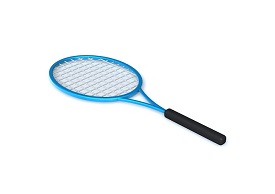
The racquets used in racquetball are very much similar to that of squash. The length of the racquet has is 22 inches. The racquets used initially were made of wood with the leather wrap grip. The frames of the racquet then slowly changed to alloy and then fiberglass and now a days graphite frames are used. Slowly oval framed racquets replaced the old small frame racquets.
Mostly two types of racquets are used in racquetball which are even- balance and head-heavy. Head-heavy racquets allow players to use more power. Nowadays the racquets used are mostly made of graphite and titanium.
Balls

The balls used in racquetball are made of rubber and have 2.25-inch diameter. Varieties of colors are used in racquetballs such as: blue, green, purple, black, red and pink.
All colors are used for specific purposes. Blue ball is most commonly used and is used for neutral ball with average speed and accuracy. Green balls are used for the same purpose that of blue balls.
Shoes
Players use specially designed shoes with great traction in racquetball. Better tractions are needed for quick changes of direction.
In case of indoor courts, the shoes used have a gum rubber outsole which provides top notch traction as the indoor court floors are made of woods and are more slippery.
The shoes are designed to provide lateral stability and cushioning to front foot.
Eyewear
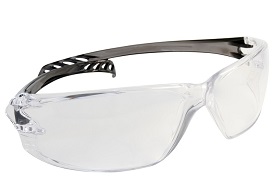
Eyewear is a must for all racquetball players because of security issues as the ball that is used in the sport flies around 100mph speed during the match raising the risk of hitting the eyes. The eyewear used fits perfectly into our eye socket.
Gloves
The use of gloves in racquetball is optional. Players wear gloves in the hand in which they hold the racquet for better grip and control. They also help preventing blisters on hands.
Racquetball - Playing Environment
A racquetball court is a rectangular enclosed area that can be indoor or outdoor. The standard length of the racquetball court is 40ft long, 20 ft wide and 20 ft long with back walls at least 12 ft high.

Different types of court markings are there in racquetball courts which are as follows −
Short Line − The short line is the middle line between the front and back walls.
Service Line − The Service line is 5 ft in front of short line and lies between the short line and front wall.
Service Zone − Service zone is a rectangular 5' × 20' area enclosed between the short line, service line, and the side walls.
Receiving Line − Receiving line is the line that is drawn 5 ft behind the short line and is placed parallel to the back wall and between the short line and back wall.
Safety Zone − Safety zone is a rectangular 5' × 20' area enclosed between the short line, receiving line, and the two side walls.
Drive Serve Lines − These are a set of lines of 3 ft drawn parallel to the side walls and within the service zone.
Doubles Service Lines − These are a set of lines of 18 inch drawn parallel to the side walls and within the service area.
In case of doubles matches, the non-serving doubles partner stands between the area enclosed by the side wall and double service lines within the service zone, which is also called the doubles box. A server must not enter in to the area enclosed between the drive serve line and side walls within the service zone, during hitting a drive service between him and the nearest side wall.
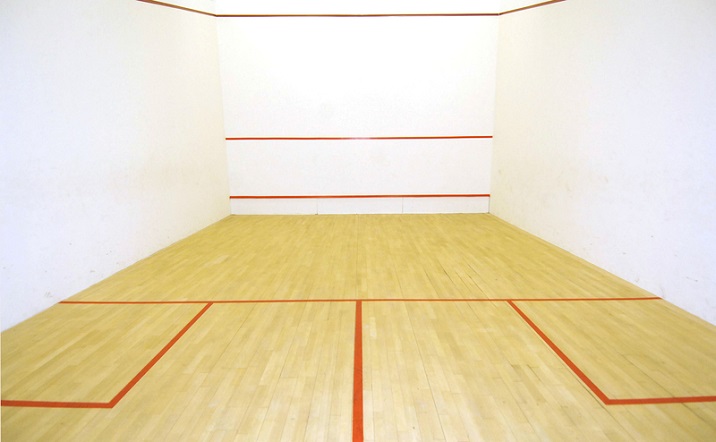
It is very much similar to that of squash court. The only difference is that the ceiling is also considered as a valid surface whereas in case of squash only four walls surrounding the room including the ground were considered as valid surface areas for the sport.
Racquetball - How to Play?
Racquetball Service
The match starts with the serve. The player who is going to serve is decided by spinning the racquet or a coin. The serving player must bounce the ball once before hitting it directly to the front wall. After hitting the front wall, the ball must fall beyond the short line; else it will be considered as a fault.

During the serve, after hitting the front wall, the ball can hit any side wall before touching the ground, but it cant hit two sidewalls before touching the ground. Touching two side walls after the coming from the front wall is called as three wall serve and is considered as a fault.
Similarly during the serve, after hitting the front wall if it directly hits the back wall without touching the ground even once, it is called as a long serve and it is also a fault. Even during the service, after hitting the front wall, if the ball touches the ceiling directly, then it is considered as a fault. Even serving before the opponent player is ready is also considered as a fault.
During the service, the player needs to put at least one foot within the service box. If his foot crosses the service area during the service or after the service before the ball has passed the short line, it is considered to be a fault. Even hitting the ball to any surface other than the front wall is considered a fault serve and the server loses serve.
Usually a server gets two chances to serve the ball properly known as the first serve and second serve. In case of bigger competitions mainly server gets a single chance to serve the ball correctly. The opponent player is allowed to play the serve once the ball crosses the serve line or passes the behind line.
Once the service is done, the opponent player tries to return it and in this way the players alternatively hit the ball to the front wall. The opponent player may choose to return the ball after one bounce or directly in the air itself. Once the serve is returned, the player has to always hit the ball to the front wall before the ball strikes the floor.
Unlike during the serve, once the serve is returned, after that the players can hit the ball to any walls provided that it finally touches the front wall before striking on the floor.
Racquetball Scoring
A rally consists of a series of shots between the two players and it starts with a serve and ends when one of the players either makes a fault or misses to return the ball successfully to the front wall. If the server wins the rally, he scores one point. Else if the opponent wins the rally, he takes over the serve but no point is given. However, if the server makes a double fault during the serve, opponent gets a point.
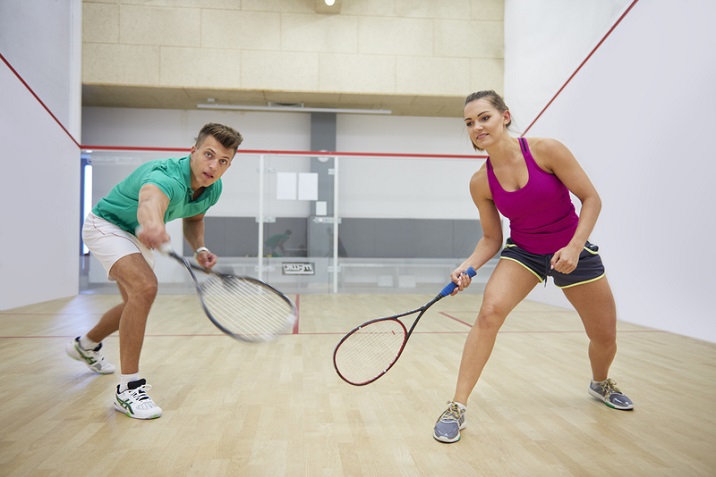
After the server hits the ball on the front wall and the opponent player is about to return it, he has to return it before it bounces twice on ground and maximum one bounce is allowed on the ground, else the server gains a point. If the player somehow carries the ball on his racquet, the opponent player gets a point.
Racquetball Number of Sets
According to USA Racquetball rules, each match consists of three sets and the player winning best of these three sets wins the match. The first two sets consist of 15 points while the third match consists of 11 points.
The player who scores the points first wins the match. In case of racquetball Canada, a winning margin of at least two points is required to win the match.
Racquetball Basic Strategies
The strategies followed here are very much similar to that of squash. Here also the player can have a greater access to all sides of a court by taking the center place of the court which is very much near to the receiving line. Players mostly make their opponent run more in the court to return shots in order to make him tired.
Another very effective strategy to gain a score is to keep the returning ball as low as possible which makes it very difficult for the opponent to return. The player always has to take the center place while trying to move the opponent from the center place by using lobs and cross court shots.
Racquetball - Shots
Players play various types of shots based on the situation during the match. While different types of shots are there in racquetball, all shots are categorized in two categories called offensive shots and defensive shots. During the serve also players play different kinds of service shots based on their own style. Brief descriptions about all these shots are as follows −
Service Shots
Service shots vary from player to player based on their style. Typically a service shot can be either an offensive shot or a defensive shot. Mostly players prefer offensive shots on their first serve and while failing to make a proper first serve, they opt for defensive serve on their second serve.
Drive Shot
One of the offensive serves is the Drive shot. This shot travels low and fast to any of the back wall corners which give the opponent very less chance to hit back.
Jam Shot
Jam shot is another type of offensive serve where the server tries to catch the opponent player off balance by using difficult angles as well as play space.
Pinch Serve
Another type of offensive serve in called pinch serve, where the ball touches the side walls very low and very much near to the service box. The ball has a little bounce and good spin and is very hard to return.
Once all these offensive shots fail in the first serve, the player opts for defensive shots on his second serve. Defensive serves are mainly meant for generating weak return from the opponent putting the server on advance. Different kinds of lob serves are considered as defensive serves.
Lob Serve
In case of a plain lob serve, the player hits the ball so hard, that it moves in a curved way to the back walls and falls near the back walls, giving the opponent very little chance to hit back a good return.
Junk Lob
In case of junk lob, the ball takes a shallow arch and falls mostly around the receiving area and confuses the receiver of being in advance, but it is meant to be a set up for an offensive shot by the server.
Offensive Shots
The Offensive shots in Racquetball are as follows −
Straight-in shots
Straight-in shots are meant to hit the front wall as low as possible. If the shot bounces twice before it passes the service line, then it is called a kill shot. A Straight-in shot hits areas which would be hard for the opponent to cover. Straight-in shots that are very hard to be returned are called down-theline and cross court passing shots.
Pinch Shot
In case of pinch and splat shots, the ball first hits the side wall before hitting the front wall, which makes it bounce twice really fast. The pinch shot first hits the side wall that is just a few inches apart from the front wall and then hits the front wall very low before going backwards diagonally. It usually bounces twice in front of the short line which makes it really hard for the opponent player to return.
Splat Shot
Splat shot is very much similar to the pinch shot. This shot is played mostly when the ball is very much near to the side walls around 6 inches to 1 ft. The ball is hit with the tip of the racquet so that it hits the side wall, gets a spin and slows down while travelling low to the front wall and almost hit the front wall in the middle.
After hitting the front wall, it again moves towards the opposite side wall while bouncing very fast before hitting the wall. The fast bounce makes it really hard for the opponent player to return it. If the player hits the ball really harder while hitting this shot, it makes a distinct splat sound.
Z-Shot
Another effective shot is called the Z shot, where the player first hits the ball really hard on the side wall. After which the ball hits the front wall and move towards the opposite wall. After hitting the opposite wall, it again moves towards the original wall while bouncing. If done correctly, it makes a z shape. This shot has confusing and is very tiresome for the opponent to hit.
Defensive Shots
Defensive shots are those which are not returned low to the front wall.
Ceiling Ball Shot
Ceiling ball shot is considered as a primary defensive shot where the ball first hits the part of the ceiling that is nearer to front wall and then the front wall. After hitting the front wall it in bounces one on the fore court and then moves towards the back wall in a high arc which makes it difficult to hit back for the opponent.
High Z Shot
Another shot is the high z where the ball is hit around 10 ft high or more on the front wall. Then it hits the side wall and then to the opposite side wall usually travelling over the opponent. After hitting the opposite side wall with a spin it moves almost perpendicular to the wall which makes it really confusing for the opponent to hit back. It is performed mostly when the opponent is near to the front wall.
Three Wall Shot
The three wall shot is the defensive version of the pinch shot. Here the ball is hit really high on the side wall near the ceiling and then it hits the front wall and then moves towards the opposite wall moving around the court in a high trajectory.
Racquetball - Rules
As the match is played in an enclosed court, so players occupying each others place during the match is a very common thing. By occupying the opponents place, players sometimes block their opponents ability to hit the ball perfectly or break the flow. These kind of occurrence are called hinders or penalty hinders.
A hinder results in restarting the rally whereas in case of a penalty hinder, point is given to the opponent. A penalty hinder happens when a player causes an avoidable obstruction that results in losing the rally. Here a player misses out a clear opportunity of scoring a point because of the obstruction of the opponent.
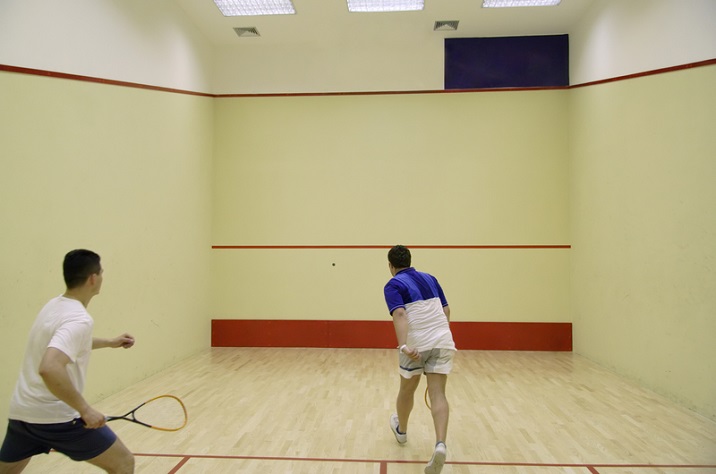
If a player doesnt move sufficiently or allow his opponent to play a shot on the front wall or pushes his opponent during playing a shot, it results in penalty hinder. Even if the player blocks the line of vision of the opponent before the opponent strikes the ball or deliberately try to disrupt the opponent by shouting or waving rackets or any kind of disturbing behaviors, it results in a penalty hinder.
The server has to make sure that the ball is dry before the serve. If during the rally the ball found out to be wet, it results in a penalty hinder to the server. If a player loses any of his equipment or apparel during the play, he can ask for a penalty hinder against the opponent.
If without the obstruction wouldnt have led the player play a winning shot, it is considered as a hinder. If the opponent is unable to avoid being touch by the ball or the player touches the opponent while trying to hit the ball, it is considered as a hinder.
There is a type of hinder called Court Hinder where the ball takes an unexpected bounce because of getting hit by flawed floors or door frames and results in replay of the rally. The referee decides the difference between the hinder and penalty hinder.
There are some cases where the interruption is considered as a hinder and the rally is restarted without scores given to anyone. Sometimes the striker refrains from hitting the ball because of the reasonable fear of injuring the opponent. He can immediately stop playing and request for a hinder. Similarly, if the receiver is not ready to play and doesnt even attempt to take the service, it results in a hinder and the rally restarts again.
Racquetball - Champions
The International Racquetball Federation (IRF) works as the governing body for racquetball. It governs all worldwide events in racquetball including the World Racquetball Championship which was held in 1981 for the first time.

Besides IRF, there are two other organizations in racquetball which are International Racquetball Tour (IRT) and Ladies Professional Racquetball Tour (LPRT).
IRT works as the professional racquetball organization for men and was founded in 1980s. LPRT works as the womens professional racquetball organization and was founded in 2012.
The main championship events in racquetball are −
- World Racquetball Championships
- US Open Racquetball Championship
- World Junior Racquetball Championships
Let us now discuss briefly about some of the champions of Racquetball and their careers.
Marty Hogan
Marty Hogan is a racquetball player from Missouri, United States and is considered as one of the best racquetball player of all time.
He has won more than 100 international as well as national titles and six U.S national championships in his 14-year career.
Such was his efficiency in the sport that he was ranked either one or two in the world in between 1976 to 1990.
He has been named the Professional Racquetball Player of the Year eight times and was inducted in to USA Racquetball Hall of Fame in 1997.
Kane Waselenchuk
Kane Walselenchuk is a racquetball player from Alberta, Canada and is considered as one of the most dominant player in all time racquetball history.
He has been the number one player in IRT tour for the 10th time and as of now has won a record number of 137 matches in a row without defeat.
Beside the IRT tournaments, he has won a record 11 U.S national championships. In case of IRF World Championship, he has won one gold, two silvers and two bronzes till now.
Rocky Carson
Rocky Carson is a racquetball player from America who is currently the champion of Mens Singles World Tournament. He won this title five times and established a record in the history of racquetball. He has won 24 IRT Tournaments till now.
In 2007-08 season he won seven tournaments and became number one IRT player. Before this season he had only three wins.
Carson has also won a gold medal in Pan American Games in 2015. He is also a winner of a gold in 2001 and a bronze in 2002 in the same event.
